

COVID-19: Briefing note #83, December 1, 2021. COVID-19: Briefing note #80, November 10, 2021 Bouncing back higher requires tackling underlying obstacles.
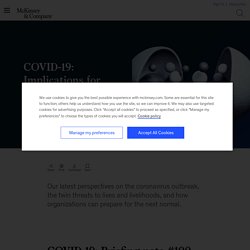
This week, McKinsey continued its exploration into how to grow economies sustainably and inclusively by focusing on the United States, its regions, and specific programs. We also examined the global fight against climate change in interviews with the authors of two books on the topic and with an article on building resilience. The United States can achieve sustainable and inclusive growth if it can address issues including the struggles of young people, who are building wealth at a much slower pace than their peers did half a century ago, and large gaps in workforce participation, wages, and higher-education attainment (exhibit).
Other challenges include climate change, which is affecting people in different geographies in the United States in various ways, and slower productivity growth. We strive to provide individuals with disabilities equal access to our website. How to Meet Customers’ Needs in Uncertain Times. About Boston Consulting Group Boston Consulting Group partners with leaders in business and society to tackle their most important challenges and capture their greatest opportunities.
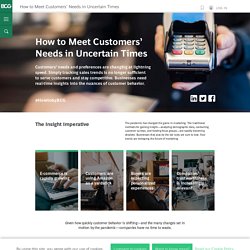
BCG was the pioneer in business strategy when it was founded in 1963. Today, we work closely with clients to embrace a transformational approach aimed at benefiting all stakeholders—empowering organizations to grow, build sustainable competitive advantage, and drive positive societal impact. Our diverse, global teams bring deep industry and functional expertise and a range of perspectives that question the status quo and spark change. BCG delivers solutions through leading-edge management consulting, technology and design, and corporate and digital ventures. . © Boston Consulting Group 2021. Will The Threat Of The Omicron Variant Cause Companies To Change Their Return To Office Plans And Allow Everyone To Work Remotely? The World Health Organization reported that a new potentially dangerous coronavirus variant—Omicron— started to spread in southern Africa and some other countries.
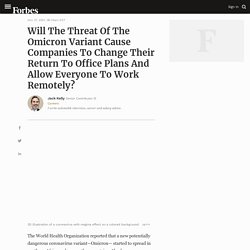
Also known as B.1.1.529, the new variant caused countries, including the U.S., to restrict travel from people in parts of Africa. South Africa saw the number of new daily cases rise from about 200 cases to 2,465 last Thursday. Prof Túlio de Oliveira, the director of the Centre for Epidemic Response and Innovation in South Africa, said in a Twitter post that there was an "unusual constellation of mutations" and that it was "very different" to other variants.
Managing a Distributed Team Through Natural Disasters (And Other Crises) The COVID-19 effect on economic conditions - October 2021. October 2021 In a change from the first three quarters in 2021, uncertainty over COVID-19 is no longer a foremost economic concern to executives, according to the latest McKinsey Global Survey.
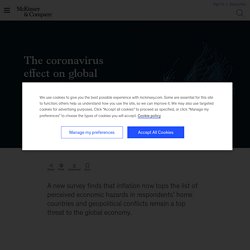
When asked about threats to growth in their countries’ economies, executives now cite mounting fallout on the supply chain—which is also the most common risk to company growth—and inflation more often than the pandemic itself. Will Relaxed Rules About Hybrid Work Improve Productivity and Performance? Topics MIT SMR Strategy Forum The MIT SMR Strategy Forum offers monthly insights from academic experts on pressing strategy issues related to business, management, technology, and public policy.
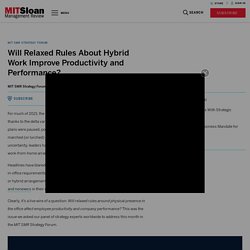
Businesses Are Making the Vaccine Mandate Stick. Businesses have been divided over whether to mandate the Covid-19 vaccine for employees.
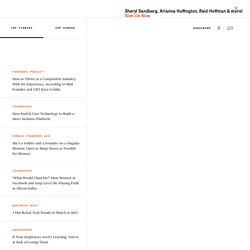
While some companies, including large organizations such as United Airlines, have had a mandate in place for months, others were a bit surprised by a policy decision made a few weeks ago. On September 9, President Joe Biden announced a new rule from the Department of Labor that, as of November 22, requires companies with 100 or more employees to ensure that each worker is fully vaccinated, or can show a negative Covid-19 test weekly. Employers will also have to give workers paid time off to get vaccinated or recover from any side effects of getting vaccinated. 42% of employees have experienced decline in mental health since Covid. Are you taking this into account or doing nothing?
Coronavirus Business Impact. The shipping crisis could ruin the holidays. Why the worst parts of work can't easily change. How to Redesign Your Office for Hybrid Work. Many employers are in the throes of planning their employees' return to the office.
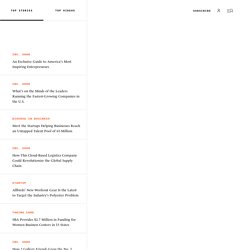
One top-of-mind consideration is how to redesign the office to accommodate new hybrid work models. According to research by Microsoft, 66 percent of employers are redesigning their offices to meet the new demands of hybrid work. As a leader, the decisions you make about redesigning your office space matter. As you contemplate redesigning your office space for a hybrid workforce, here are three strategies to set your employees up for success: 1. Just like other aspects of remote work, you can't afford to rely on your gut to make mission-critical decisions about how to redesign your office space. Navigating an asymmetrical recovery.
If there’s one thing we’ve learned since early 2020, when COVID-19 began disrupting lives, livelihoods, and the global economy, it’s that the road ahead can take surprising twists and turns.
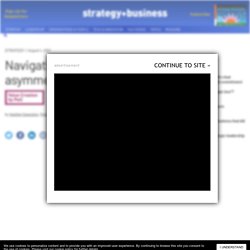
In the US, where the vaccine rollouts helped spur hiring and a return to normal, the Centers for Disease Control’s recent reversal on indoor mask-wearing guidance for vaccinated US citizens was a stark reminder of how quickly conditions can change. New strains of COVID, such as the aggressive Delta variant, continue to upend plans. And the situation is even more complex in many other regions, where the continuing impact of the virus is creating a business environment full of asymmetries and unanticipated disruptions.
Has the Delta Variant Disrupted Your Office Reopening Plans? 3 Ways Businesses Are Responding to the Delta Variant. The U.S. may be on the verge of another pandemic wave, as the highly contagious Delta variant, now the most common strain in the U.S., accounts for 83 percent of analyzed infections.
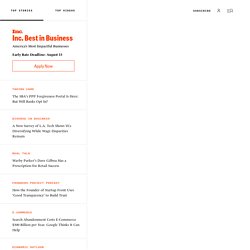
Businesses are preparing for the worst--again. The worker-employer relationship disrupted. This special report explores one set of possible answers to the central question: How might the worker-employer relationship evolve to meet the opportunities and challenges of the post–COVID-19 world?
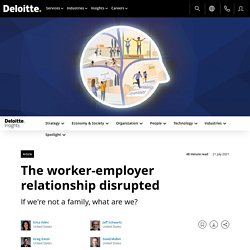
In a world full of uncertainties, we’ve used scenario planning to explore the possible futures of the worker-employer relationship, seeking to challenge conventional wisdom, stretch our thinking and horizons, and chart a new course. The insights on the following pages leverage our scenario planning methodology and are fueled by research findings from a combination of social media polling, live survey polling, artificial intelligence (AI)–enabled focus groups, and interviews with business and HR executives across industries and workers all over the world. COVID-19: Testing the limits of the worker-employer relationship The pandemic strained and tested the worker-employer relationship.
Sometimes, these pressures yielded great benefits. The Delta Variant: How Companies Should Respond. How to Develop a Covid-19 Employee Vaccination Policy. Employers around the world are struggling with the question of whether they should mandate that their workers be vaccinated against Covid-19. Houston Methodist, an eight-hospital academic medical center, developed a seven-step process that can... Employers grappling with the issue of whether to require their workers to be vaccinated against Covid-19 as well as other infectious diseases may benefit from the process that Houston Methodist, an academic medical center comprising eight hospitals in Houston, used to make that decision.
On March 31, 2021, we mandated that our 26,000 employees, with some exceptions, be vaccinated, making ours the first U.S. hospital system to do so. Soon after, the mandate was extended to 7,500 private-practice physicians with privileges to care for patients at our hospitals. How to Lead Your Team Through the Transition Back to the Office. Companies Who Easily Adapted To Remote Work Had This One Thing In Common. Report: Women @ Work: A Global Outlook. Is organizational culture the hero or villain of your pandemic story? Corporate culture, enabled by strong leadership, has never been more important for organizations than in this past year, as COVID-19 forced drastic changes in the workplace.
That leadership, though, wasn’t just from the people at the top; equally important were the informal leaders down through the ranks who embody an organization’s culture, help hold teams together, and motivate people to get things done. As the Polish film director and screenwriter Krzysztof Kieślowski once said, “If culture is capable of anything, then it is finding that which unites us all.” In some respects, then, it is somewhat ironic that, before the pandemic, people said they were increasingly unhappy with their organizational cultures. In our 2018 global culture survey, people told us they wanted the status quo to change and in short order.
Now, it seems, faced with so much change, people are worried about and/or mourning the loss of those very same workplace cultures. Observations and reflections. Confused by the CDC's Latest Guidelines? Then Ignore Them. Last week the Centers for Disease Control and Prevention (CDC) updated its guidance to say it's safe for vaccinated people to go without masks in most settings.
Shortly after, a number of major retailers including Walmart, Costco, and Starbucks, lifted mask requirements for customers and employees who are fully vaccinated. The retailers will rely on an unspoken honor system in which they trust that unmasked employees and customers have received a jab. The CDC's decisions over the last year have encountered plenty of backlash for causing mass confusion for individuals and businesses.
But one thing has been made clear with this last set of guidelines: it's okay to ignore them. A Tidal Wave of Employee Burnout Is Coming. Here Are 3 Actions to Take Right Now. After a year of a remote work environment, it's clear that even the most resilient appearing workforces are suffering from burnout. Front line professions like health care are among the worst hit, with people juggling work, children, aging parents and reporting high stress. People in factories, retail, delivery and public safety have all had to adopt difficult new routines. My company Workhuman recently surveyed 1,000 U.S. 5 Strategies to Keep Moms. During the depths of the pandemic, business owners had to get creative about keeping their best employees--especially moms, who were more likely to have to quit their jobs to care for school-age kids and sick family members.
Now, with a light at the end of the tunnel, many entrepreneurs have no desire to go back to 2019. Their pandemic-era strategies, devised to help hold onto parents, are helping them retain valued employees, recruit talent, and often, work more efficiently. Leading Through the Big Transition to the New Reality. Yet despite the popularity of remote and hybrid work models during the pandemic, we do not yet understand any long-term consequences—from sustainability to performance management—that may result from them.
Companies have a rare window to develop practices, tools, and training to improve team effectiveness and culture with these models as they shape the new reality. Leaders will also grapple with a whole other set of questions about the future of work. For example, how will flexible working hours, reductions in business travel, and new teaming and communication models be permanently incorporated into operating models? The COVID-19 effect on economic conditions - April 2021. What a Year of WFH Has Done to Our Relationships at Work. More than a year into the Covid-19 pandemic and WFH, new research from Microsoft shows that employees and teams are becoming much more siloed.
In particular, connections with people outside our immediate teams has shrunk dramatically,... Reimagining Collaboration: Slack, Microsoft Teams, Zoom, and the Post-COVID World of Work (20 December 2020) by Phil Simon. Strengthen Agility during COVID-19. Why Agility? We have learned a lot about COVID-19 in the past few months and we are still learning and adapting. Adapting to the Hybrid Workplace after a Year of Change. The Wellbeing-Engagement Paradox of 2020. Story Highlights. What a Year of WFH Has Done to Our Relationships at Work.
How to reenergize your organization to overcome pandemic fatigue. March 1, 2021Pandemic fatigue is real: Some 75 percent of employees in the U.S. and close to a third in the APAC region report symptoms of burnout. The number of those who rate their mental health as “very poor” is more than three times higher than before the crisis. 7 Ways to Save Your Working Moms Before It's Too Late. Story Highlights Women's wellbeing slipped as their levels of stress and worry roseThe workforce has lost over 2 million women since the pandemic beganLeaders can set the tone for working moms with these seven things The pandemic changed everything. How Have U.S. Working Women Fared During the Pandemic? Story Highlights. Video: 4 things leaders can do to support remote employees. A CEO’s Guide to Planning a Return to the Office. As Pandemic Fatigue Sets in at Work, Employers Try to Help.
People are tired. Between a global pandemic, economic crisis, social unrest, and political upheaval, the past year has been physically and emotionally draining for just about everyone, and perhaps most for essential workers. Across industries, workers struggling with pandemic fatigue are facing burnout more than ever. How the pandemic transformed digital manufacturing. In 2020, industrial digitization faced its biggest test to date. People problems. How to Get Employees to Report Their Covid-19 Risk. The Gates Foundation, COVID-19, and the race for a vaccine. Don’t Let Your Company Culture Falter During the Pandemic. Closing the capability gap in the time of COVID-19. How to Do a Virtual Company Holiday Party the Right Way. The Pandemic Is Widening a Corporate Productivity Gap. Survey: Diverse employees are struggling the most during COVID-19—here’s how companies can respond.
Small Businesses Gird for a Wave of the Coronavirus Unlike Any Other. The Story of Pollution - Getting past the pandemic. Podcast: Managing Working Parents During the Pandemic. Healthcare innovation: Building on gains made through the crisis. Comment les entrepreneurs s’adaptent à la pandémie – Étude. On weeks where decades happen. Creating a resilient and optimistic workplace. How Companies Are Winning on Culture During COVID-19. Government workforce experience. Quand le télétravail rime avec désastre et bombe à retardement. How working from home works out. Battling Pandemic Blues: How Managers Can Rally the Troops. Le pilotage en temps de pandémie. How to Develop Your Leadership Style. The Impact of COVID-19 on Employee Engagement. A Manager's Toolkit for Supporting Change. 4 Tips for Effective Virtual Collaboration. The importance of psychological safety in the workplace.
Companies are just now starting to figure out remote work. The postpandemic workforce: Responses to a McKinsey global survey of 800 executives. COVID-19: Product and Spatial Design in a Pandemic. Hidden perils of unresolved grief. Your organization is grieving. Psychological-safety leadership in a time of flux. Leading Through COVID-19: How To Get Your People On Board. Podcast: How businesses can confront the COVID-19 crisis - Actionable insights to help businesses respond and recover. A Lot Will Change—So Must Leadership. An Exercise to Help Your Team Overcome the Trauma of the Pandemic. 7 Strategies for Leading a Crisis-Driven Reorg. How to Make Rational Decisions in the Face of Uncertainty. This interactive tool lets you test COVID-19 reopening strategies. How to Foster Psychological Safety in Virtual Meetings. How CEOs can navigate an uncertain economic future.
Thriving during a pandemic: What moves the needle on organizational health. Collaborating During Coronavirus: The Impact of COVID-19 on the Nature of Work (July 2020) by Evan DeFilippis, Stephen Michael Impink, Madison Singell, Jeffrey T. Polzer, Raffaella Sadun. Sustaining inclusion in our new remote work environment. Innovation in a crisis: Why it is more critical than ever. CEO leadership for a new era. The Continuing Spread of COVID-19 is Keeping Most Employers in a Holding Pattern. INSEAD Leadership and Consultation Blog. Remote Workplace Success - Survey Results. 1 employeur sur 2 s'apprête à renoncer au télétravail! Technology in the Pandemic: Recreate the Office or Repurpose It? Report - How governments can navigate in a disrupted world.
Guides to bereavement support. Coronavirus' business impact: Evolving perspective - Executive briefing as of 9 July 2020. As COVID-19 Continues, Employees Are Feeling Less Prepared. Coronavirus' business impact: Evolving perspective - Briefing Note as of 2 July 2020. Demystifying modeling: How quantitative models can. Leaders are building new muscles to deal with the pandemic. Fostering employee productivity and morale through COVID-19. 6 things the best bosses know will help workers and companies thrive in a recession.